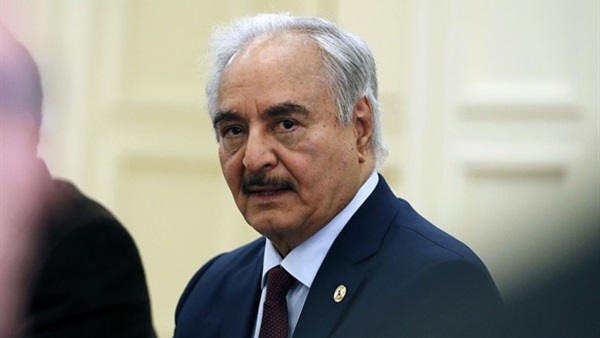On Libya's Independence Day: Haftar sends message to the people and threatens terrorists

The Commander-in-Chief of the Libyan Army, Field Marshal Khalifa Haftar, delivered a speech on December 24 in downtown Benghazi on the occasion of the 71st anniversary of Libya's independence, with a number of important political messages on the internal and external levels, during which he sought to reassure the Libyan people, as well as to warn terrorist groups that seek to keep the Libyan state in the crucible of chaos and instability in order to plunder its wealth and capabilities.
This speech came a year after the Libyan elections that were scheduled to take place on December 24, 2021 were postponed for a year and then also did not take place due to the state of “political stalemate” in Libya, which suffers from divided governments, one of which is the Government of National Unity (GNU) led by Abdul Hamid Dabaiba in western Libya, the term of which has expired, and the second in eastern Libyan headed by Fathi Bashagha, in addition to the armed militias deployed in the west, which are targeting the Libyan National Army led by Field Marshal Khalifa Haftar to destabilize Libya’s security and stability.
Roadmap
Haftar emphasized a number of points in his speech, including talking about the existence of a “last” opportunity to draw the roadmap in Libya and hold parliamentary and presidential elections. He sent a warning message to the militias threatening the country’s security, stressing that the unity of Libya is a “red line” and that the Libyan National Army forces will not allow anyone to encroach on the country and compromise its security and control its oil wealth.
In his speech, Haftar focused on sending a message to the Libyan people, asking them to unite behind the military establishment and support it to unite the ranks of the nation so that it can eliminate the groups and political forces that want evil for the country.
“The people cannot remain silent about the abuse that is happening to the Libyans in the presence of political bodies that obstructed the elections,” he said. In this context, the military commander called leaders in the regions and cities of western Libya for a Libyan-Libyan dialogue that contributes to reunification and confronting illegal activities.
Foreign support
In addition to the messages that Haftar sent to the Libyan interior, he appealed at the same time to the international community and concerned international organizations, especially the United Nations, urging them to intervene to resolve the Libyan crisis, which has entered its eleventh year. “We recall that we are the first to call for free, fair and transparent elections, and the United Nations mission must shoulder its responsibility to resolve the Libyan crisis,” he said.
Settlement or escalation?
Regarding the significance of Haftar’s speech, Munir Adeeb, a researcher who specializes in extremist movements and international terrorism, said that the main goal of it is a political settlement, not a military escalation, but at the same time it sends a warning to all those who stand before this settlement that may lead the country to stability.
Adeeb pointed out in a special statement to the Reference that Haftar’s speech included a warning to the armed groups in Libya that insist on creating a state of chaos and obstructing the political settlement, with the aim of emphasizing that the army seeks to take the country towards stability through a settlement that includes all spectrums, hoping for a real political experiment and civil rule. He added that this warning includes within it an assertion that if the political settlement process fails and the intransigence of the other parties to the conflict continues, the Libyan forces will head towards escalation.





